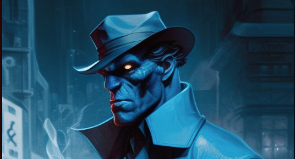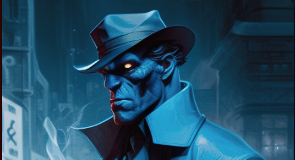How Answering The Editor’s Six Core Questions Can Unlock Your Novel

When I started writing THE BLUE GOLEM in 2014 all I had was a mental image of the first scene, a man waking up in the body of an 8′ tall clay golem in a strange place with knowledge but no memory. I didn’t know anything else and while I wrote the (very rough) first draft in 30 days, it took me five years to polish it up to the place where I can publish it.
I’ve learned a lot since then. I learned about the Story Grid and how story structure analysis can help a writer not just at the end of an existing novel but also when you’re first sitting down to write a new one. For instance, I attended a three day Plotting Madness Boot Camp in Lake Tahoe and while out there, I plotted out ten key scenes, layered in ten more using an action / reaction motif, and then plotted out ten subplots I can layer in for added richness.
But the coolest thing about the experience had less to do with plot and more to do with genre. For THE BLUE GOLEM, I learned that while my book presents as a Fantasy / Noir for marketing purposes, it’s actually a Thriller under-the-hood. In Story Grid terms that means the story uses the global life value of Life / Unconsciousness / Death / Threat of Damnation. The conventions and obligatory scenes for a Thriller told me that I needed a crime in the first chapter, a MacGuffin, red herrings, a false ending, and so forth.
But while I expected the sequel to be also be a Thriller, I was a little shocked when I realized I was looking at a different animal altogether.
Let’s back up a little and talk about Shawn Coyne’s editor’s six core questions and how answering them can help you find and keep passion for your novel.
An editor handed a pile of manuscript pages must answer a whole bunch of questions before he can even begin to diagnose the effectiveness of the storytelling. While he’ll know after one read whether or not the book “works,” in order to take the book to the next level, he’ll have to figure out exactly how it is working. He has to put the whole book onto one page.
To refresh your memory, here are the six questions he must answer:
1. What’s the genre?
2. What are the conventions and obligatory scenes for that genre?
3. What’s the Point of View?
4. What are the objects of desire?
5. What’s the controlling idea/theme?
6. What is the Beginning Hook, the Middle Build, and Ending Payoff?
My idea had to do with something called ‘phantom debt,’ something I read about in Bloomberg a year or so ago. The thing is, as I thought about plotting out THE BLACK SERPENT where my golem PI gets pulled into an ever expanding financial problem which threatens to engulf the entire land in secrets and corruption, I realized I wasn’t looking at a Thriller. Instead, I began to get the sneaking suspicion I was looking at a Crime story (again presenting as a Fantasy / Noir). The Global Life Value is different for the Crime genre than a Thriller and runs the gamut from Tyranny to Justice. To check this I pinged my friend Story Grid editor Rachelle Ramirez and she confirmed a few key things for me.

Once I answered the genre question I looked up Rachelle’s indispensable post on the Crime genre – that’s where I figured out the stuff for point #2 – the Crime conventions and obligatory scenes. There I learned that many of the Crime elements are the same as for the Thriller but there are some key differences. A new scene this time around was “The protagonist is actively trying to solve a crime or a puzzle and either bring the antagonist to justice or, in the case of heist and caper stories, escape justice themselves.” I plugged that in and, viola, I had another plot point sketched out.
And so forth down the list. If you’re kicking around ideas for a novel, I strongly recommend thinking about these six core questions for your novel. I think you’ll find the going gets much easier when you establish a strong foundation for your novel and it’s a lot more fun crafting a novel when you can plug in these big, fundamental pieces right up front. That’s one of the ways I was able to walk into my three day boot camp with the vaguest of ideas and walk out with thirty solid plot points. I can write dialogue and scenes all day as long as I know what comes next, generally speaking. Having these tools at your disposal makes writing both easier and so much more fun.

